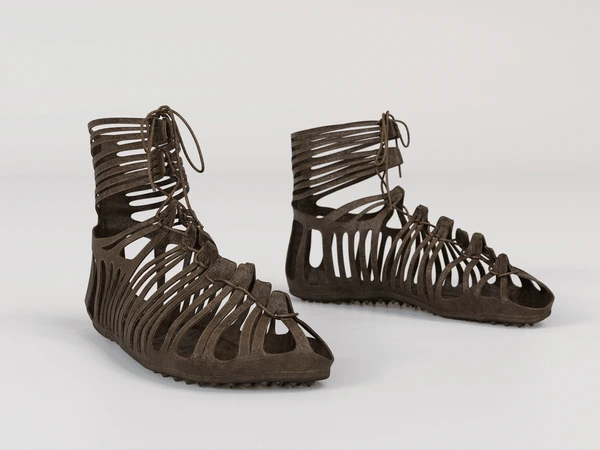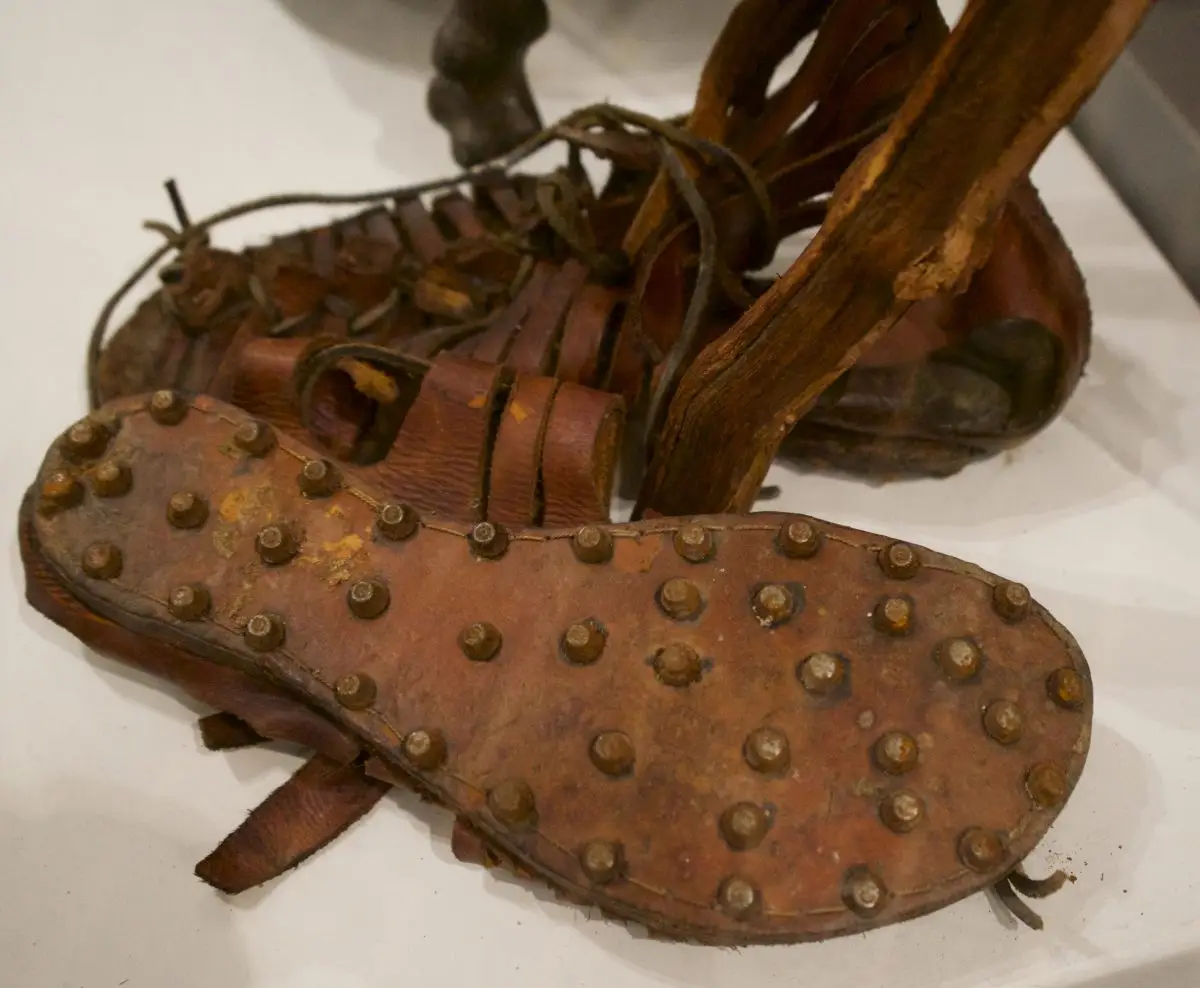Shoes: Gospel of Peace
- Q

- Nov 7, 2025
- 6 min read
"... and having shod your feet with the preparation of the gospel of peace;" (Eph 6:15)
Have you ever stopped to think about your shoes? Really think about them?
We have shoes for running, shoes for work, shoes for fancy dinners, and fuzzy slippers for home. We intuitively know that the right footwear is essential for the task at hand. You wouldn't run a marathon in hiking boots, and you wouldn't hike a mountain in dress shoes. The right shoes provide protection, stability, and the agility to finish the journey or task at hand.
It’s no wonder, then, that when the Apostle Paul describes the "armor of God" in Ephesians, he includes a very specific kind of footwear. He commands us to stand firm, "having shod your feet with the preparation of the gospel of peace".
But what does that mean? What are these "shoes," and why are they so critical to our spiritual lives? To understand this, let's look back at the warriors of the ancient world. They knew, better than anyone, that a battle could be lost for lack of a proper shoe.
The Soldier's Firm Foundation
While ancient Greek hoplites sometimes fought barefoot, a practice common in a culture where it was normal for physical labor, it was the Romans who truly mastered military footwear. Their legions, famous for conquering vast territories, understood that an army marches on its feet.
Their most famous footwear was the caliga. This wasn't just a simple sandal; it was a marvel of military engineering.
It was durable: The sole was made of multiple layers of leather.
It was stable: The sole was studded with iron hobnails, called clavi. These studs gave the soldier a "formidable" grip, providing exceptional traction on everything from muddy fields to rocky hills.
It was built for the long haul: The open-air design kept the soldiers' feet dry on long marches, preventing the blisters and infections that could cripple a campaign.
A Roman soldier's caligae were his foundation. They gave him the confidence to stand his ground, the stability to hold the line, and the endurance to advance into enemy territory.
And this, my friends, is exactly what the "Gospel of Peace" does for us.
Variety of soldiers' boots from antiquity to modern applications. Hobnails also shown.
What Is This "Peace"?
Often, we think of peace as simply the absence of conflict. But the Bible's definition is so much richer. The Hebrew word, shalom, isn't passive; it's a dynamic concept of wholeness, health, prosperity, and total well-being.
This peace isn't something we create. It's a gift from God; a transcendent force with God as its ultimate source. This divine peace is powerful because it is not subject to life’s extremities and can offer solace, encouragement, and the potential to transform circumstances. Indeed, it surpasses all human understanding and guards the hearts and minds of the soldiers of the Lord through and in Christ Jesus (Phil 4:9).
This peace is, principally, peace with God. Before Christ, we were separated from God. But now, as Paul writes, "Therefore, having been justified by faith, we have peace with God through our Lord Jesus Christ" (Rom 5:1).
This is our foundation. This is our caliga.
Putting On Your Shoes
When your feet are "shod" with the Gospel of Peace, you are grounded in the unshakeable reality that your relationship with God is secure. "For He Himself is our peace, who has made both one, and has broken down the middle wall of separation" (Eph 2:14).
When the world lurches, when chaos reigns, when anxiety and fear try to knock you off your feet, you have traction. You have your "hobnails." You are rooted in a peace that is not a static concept but a dynamic condition of wholeness. This is why being "spiritually minded is life and peace" (Rom 8:6).
But these shoes aren't just for standing still. They are for preparation. They are for moving. The Roman soldier's shoes prepared him to march. Our shoes prepare us to carry the "good news." When your heart is secure in the peace of God, you are ready and able to carry that message of peace to others.
How beautiful upon the mountains are the feet of him who brings good news, who proclaims peace, who brings glad tidings of good things, who proclaims salvation, who says to Zion, “Your God reigns!” (Isaiah 52:7)
The Paradox of Peace
Now, you may be thinking of what Jesus himself said:
"Do not think that I came to bring peace on earth. I did not come to bring peace but a sword." (Matt 10:34)
"Do you suppose that I came to give peace on earth? I tell you, not at all, but rather division." (Luke 12:51)
How can this be? It's because the Gospel of Peace is a dividing line. The peace with God that we receive through faith in Christ (Rom 5:1) automatically puts us at odds with a world that is at war with God. To be "spiritually minded" (peace) is the very opposite of being "carnally minded" (death).
Our peace is a person, and He demands a choice between accepting or rejecting Him. He give peace to those who accept Him, a fruit of the Holy Spirit (Gal 5:22) that grounds the believer in God even in perilous times.
Furthermore, it is important to note the exact phrase Paul uses. He says we are to have our feet shod in "the preparation of the gospel of peace."
This is not a passive instruction. Our "shoes" aren't just for standing; they are for preparing to move. And what is this "Gospel of Peace"? It is the Good News. It is the Word of God.
Think of it this way: For an army to bring lasting peace to a war-torn region, it cannot just show up. It has to come with a plan. It must have full knowledge of what true peace looks like and have the skills—and the authority—to remove what doesn’t look like peace.
This is precisely how we reconcile Paul’s "Gospel of Peace" with Jesus’s own startling words. Jesus's words don't contradict Paul's teachings; they give the soldier of Christ the blueprint on how to action Paul's teachings.
Jesus is our peace (Eph 2:14). He is the Word (John 1:1). He is the Gospel.
When Paul urges us to be "prepared in Jesus," he is telling us to put on the correct wartime boots and learn how to use them in the fight. We have to be fully immersed in the word of God. We have to hide it in our hearts (Ps 119:11) so we do not deviate from it (sin).
Jesus, our Commander, is telling us that delivery of this Good News we have hidden in our hearts will be a battle in a spiritual war. Indeed the Word of God, our very message of peace, is a sword. The Gospel of Peace exposes the darkness. It divides truth from lies.
"For the word of God is living and powerful, and sharper than any two-edged sword, piercing even to the division of soul and spirit, and of joints and marrow, and is a discerner of the thoughts and intents of the heart." (Heb 4:12)
This is why a soldier in the army of the Lord must be grounded in the Word of God. If we are not stable on our "shoes," if we are not rooted in the Gospel we claim to carry, we will stumble at the first sign of resistance. We will fail in our mission to deliver the Good News to the lost.
As such, there is no paradox or contradiction between Jesus and Paul. Rather, Paul points to the Jesus as our foundation and banner through this battle. He is indeed Jehovah Nissi.
Walk in Peace
Just as a Roman soldier would be naked and unprepared for battle without his caligae, we are spiritually vulnerable without the "Gospel of Peace."
This peace is our stability in a slipping world. It is our endurance for the long journey of faith. It is our "preparation" to stand firm against attack and our "readiness" to advance with the good news. It is the fundamental "right relationship" with God, each other, and creation.
So, today, check your spiritual footwear. Ground yourself in the unshakable truth that you are at peace with God through Jesus Christ. Stand firm in that.
And then, let the "God of peace crush Satan under your feet shortly." (Rom 16:20).
Walk Well and Be Blessed!!













Amen